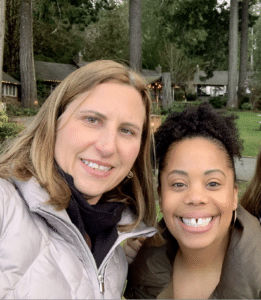Start Early Washington is grateful to be building strong partnerships with organizations that share our values and goals.

Cultivating Change: A Conversation with the Stolte Family Foundation
Stolte Family Foundation’s founder, Heidi Stolte, and senior education program officer Brianna Jackson share insights on the foundation’s mission to address early learning and opportunity gaps.

Start Early Washington had the opportunity recently to sit down with founder Heidi Stolte, and senior education program officer Brianna Jackson, and hear their thoughts on how efforts in the early learning education field are contributing to closing critical early learning and opportunity gaps.
Inspirational Beginnings
Thinking back to the beginning, what influenced your focus for the Foundation’s education goals on closing opportunity gaps by engaging families and communities in our region?
Heidi: When my husband Chris and I were deciding on the focus for the foundation and the inspiration for education, we had young children at the time, and I reflected on my experiences as a teacher and volunteer and the gaps that kids come to kindergarten with as far as being prepared to learn. Often unfortunately when they start out unprepared, they don’t catch up and they remain behind. Those early years and brain development between ages 0 to 5 are critical, so we recognized how critical the impacts of supporting early childhood learning are.
As I began to work with Social Venture Partners (SVP) on their early learning grant committee in 2011, we saw how much is either gained or lost in those earliest years and that starting early with healthy development is important. Seattle Foundation introduced us to local organizations doing early learning work, and specifically to ParentChild+ (PC+).
Having worked in education I just soaked up all of the little things I observed in PC+, like how early learning specialists provide coaching and role modeling, meeting the parents where they are at, supporting parents with learning how to enhance both the cognitive and social-emotional skills of their child, and also providing critical resources and supports. There are so many components of PC+ that spoke to me.
Evolution of Focus
Going back to where things started in 2015, as you began the evolution of investing in early childhood and PC+, what’s changed the most for both of you?
Heidi: We focused on two areas: early learning and summer learning loss. The time when learning can be gained or lost, and we thought we could have some positive impact on that. In 2018 when we hired our first Education Program Officer, we realized that we needed to dive into this a little more and dedicate time to strategy and planning. We looked into a lot of areas and considered what spoke to us, what was needed, what gaps existed in funding, assessed education data both locally and nationally, and identified what geographic areas needed more resources and support. From there we decided to focus on parent-family engagement. Parents are such an important connection for children as their first teacher throughout their whole lives, and this is a critical time when they are with them before school begins.
Brianna: As you learn more, you become more intentional about your work. We have been able to be more on the ground and build the relationships with amazing community organizations, and be a bridge to increase visibility of those organizations with larger funders. We have been able to fund both systems-level as well as direct-service organizations, a great evolution for our investments.
Embracing Optimism
As a funder, and more important as someone entrenched in the work and watching the work change, what are you most optimistic about in the early childhood space going forward?
Brianna: There have been great wins in Washington state around early childhood and public funding, for example more of a focus on provider wages and ensuring that providers can make a livable wage. It’s exciting to see the direction things are moving with the Fair Start for Kids Act with the increase of access to child care benefits and consideration for the economic health of Washington’s families. In the 20+ years that I have been in this work, I am encouraged to see that we are finally understanding as a society that you can’t NOT invest in early childhood. And when we don’t invest in this critical period of development and growth for children and families there are real economic and social repercussions.
"So many of our goals are aligned with Start Early Washington around what it takes to build a comprehensive P-5 [prenatal to age 5] system in WA. Start Early Washington feels like our jam!" - Brianna
Brianna: When we look at our partnership, and what attracted us to the work of Start Early Washington, it really comes down to being excited about PC+ and what home visiting could look like in Washington state.
We love that Start Early Washington is thinking about how to strengthen a system by prioritizing those who are doing work within that system. Providing strong professional development, technical assistance support, and a framework for what core competencies look like across high-quality home visiting is key to their approach. We know that this is contributing to the overall strengthening of PC+ and therefore the home visiting system overall. We are also excited about the policy and advocacy work Start Early Washington is involved in; that they are not only focused on what it looks like on the ground but what it looks like at the systems level to build better policies for children and families. If we are not doing both then we are doing the field a disservice.
______________________________________________________________________
Learn more about the Stolte Family Foundation’s thoughtful commitment to improving the futures of Washington’s children and families.
About the Author

Andrea Mackin
Assistant Director of Development and Communications, Start Early Washington
Andrea “Andie” Mackin leads Start Early Washington’s Development and Communications efforts across Washington state.
More About Andrea “Andie”